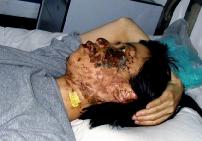(Clearwisdom.net)
However, nowhere in the short article can we find information regarding the Committee and China's obligations as a signatory of internal conventions on torture. I've taken the liberty of filling in some of the blanks on relevant background information.
The Committee was established in 1987 to monitor compliance with the Convention against Torture and Other Cruel, Inhuman or Degrading Treatment or Punishment (hereafter "the Convention"), which entered into force on June 26, 1987. According to the U.N., "States parties to the Convention are required to outlaw torture and are explicitly prohibited from using 'higher orders' or 'exceptional circumstances' as excuses for acts of torture." (from http://www.un.org/)
As with other U.N. human rights conventions, the Convention intends to prevent governments from abusing their power to trample on human rights and committing crimes against humanity. In other words, by ratifying the Convention, States agree to have the Committee monitor their implementation of the Convention provisions in order to protect their citizens' human rights. Therefore, when faced with criticism from the international community, the Chinese Communist Party (CCP) simply can't shrug off the criticism by saying that the U.N. is interfering with its internal affairs.
On November 7, 2008, the Committee began its consideration of the fourth periodic reports on China. On November 21, the Committee issued its concluding observations and recommendations concerning reports from China. Their recommendations include the following:
"China should immediately conduct or commission an independent investigation of the claims that some Falun Gong practitioners had been subjected to torture and used for organ transplants and take measures, as appropriate, to ensure that those responsible for such abuses were prosecuted and punished."
The Committee also indicated, "A further concern was the extended use of all forms of administrative detention, including 'Re-education through Labour', for individuals who had never had their case tried in court, nor had the possibility of challenging their detention, as well as by allegations that secret detention facilities, including the so-called 'black jails', were used to detain petitioners. Detention in such facilities constituted per se disappearance." Moreover, the Committee requested further explanations on "the reported harassment of lawyers and human rights defenders; and the abuses carried out by unaccountable 'thugs' against specific defenders."
(Note: the Committee's full recommendations can be viewed at: http://www.unog.ch/unog/website/news_media.nsf/(httpNewsByYear_en)/43C80DA746870C23C1257508003AC7C6?OpenDocument)
The Committee has a panel of 10 independent experts that are chosen from States parties. Individual experts can draft their recommendations for any State party, but the Committee needs to approve it before publishing such recommendations.
According to the Convention, every State party is obligated to submit a report to the Committee every four years. Since ratifying the Convention in 1988, however, China has only submitted four reports for consideration. The first report wasn't turned in until 1993, likely due to the bloody suppression of the June 4th student democracy movement in 1989. In 2004, the CCP skipped the fourth report due that year, most likely to avoid addressing its suppression of Falun Gong. In every report, the CCP claims that China has made huge improvements in reducing its torture cases. However, when measured against the Convention, such improvement is merely shown in terms legislative and administrative initiatives. The actual implementation of such initiatives has never materialized. After the CCP began its persecution of Falun Gong, the U.N. Human Rights Commissioner's office has sent thousands of inquiries regarding the cause of deaths of practitioners. The CCP claims these practitioners all died natural deaths, but it can't deny the fact that their deaths occurred during their detention.
Gao Rongrong before and after being tortured via electric shock
One of the most severe torture cases documented is that of Gao Rongrong, a Falun Gong practitioner who worked at the Luxun Art School in Shenyang, Liaoning Province. On May 7, 2004, two guards at the Longshan Labor Camp named Tang Yubao and Jiang Zhaohua shocked Gao's face with electric batons for seven hours, severely deforming Gao's face. After this case was exposed, the CCP ordered that Gao never be allowed to leave. On October 5, 2004, Gao managed to escape the detention center with the help of other practitioners. Instead of punishing the two guards that had harmed Gao, the CCP placed Gao on the wanted list. On March 6, 2005, Gao was arrested again. This time she was tortured to death on June 10 of the same year. Some of the practitioners that helped Gao get out of detention in October 2004 are still being detained today.
Regarding the 2008 report that the CCP submitted, the Committee had requested further explanations on a series of issues and asked for evidence of the claimed reduction of torture cases, before it issued its conclusions and recommendations on November 21, 2008. The CCP was given a chance to justify its report, and it apparently failed to convince the Committee.
It is not difficult to conclude that the CCP is the obstacle that stands in the way of creating a healthy, stable nation that is ruled by law.





